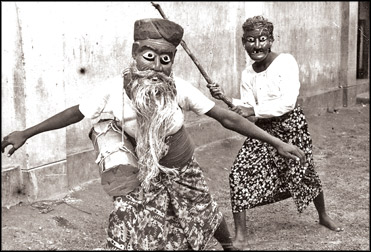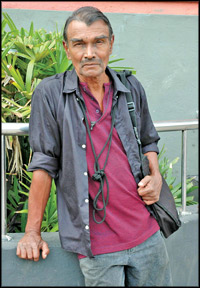Let Shakespeare enrich our cultural encounters
by Gamini HATTOTUWEGAMA
A biographical mischief maker once claimed that I grew up with
Shakespeare. As a schoolboy I did roll through Shylock, Mark Antony,
Hotspur, Hamlet in long and short spells. As an undergrad majoring in
English I took the Shakespeare pummelling that we students were heir to,
returning it in good part and good heart years later as a University
Lecturer in English and Fine arts. My undergrad days rolled me back into
acting in the most serious and dignified theatre the country then
produced, either in Sinhala or English, but it was when I became the 1st
ever English Honours student to produce a Sinhala play that I tumbled
into some kind of history not through Shakespeare but Chekov.
 |
|
Kolam performance |
Incidentally, Chekov competes with Shakespeare as the most produced
foreign dramatist in Sri Lanka. I hope Mr. Obinamuni Gamini De Silva,
President Shakespeare Centre Sri Lanka, these competitions will induce
both teachers and schoolchildren to study our own theatre history, let
alone the Shakespeare texts, which is an obvious compulsion. Our country
has been tuned to Shakespeare from the 19th century and many schools
have been farming the big guy! My own school is Richmond College, Galle,
and some exciting Shakespeare resonances carry me back there. Sri
Lanka’s 1st and greatest Shakespeare scholar E.F.C. Ludowyke, came from
Richmond, and then at Cambridge University he knocked the pants off all
the competing British, American, Canadian, Australian, West Indian and
Asian scholars to win the coveted Oldham prize for Shakespeare
scholarship.
What is even more exciting about this Shakespeare expert is that he
came back to this country of his birth to become not only our first Sri
Lankan Professor of English but our first most inventive and subversive
of English play” producers. Going only once or twice to Shakespeare, he
pushes Sudhrake’s Sanskrit play Cart into King George’s Hall, also calls
on the, 2000-year-old Chinese Lady Precious Stream, and introduces
Germany’s great Brecht as early as 1949 via “The Good Woman of Setzuan”
(our good, good woman being that Shakespeare teacher director Jeane
Pinto) and then produces a Sinhala Gogal “Kapuwa Kapothi” with the
supreme sun in our theatre horizon Ediriweera Sarachchandra as adapter-transcreator
of the Russian play.
Ludowyke’s readings of Shakespeare in class were a treat. He never
resorted to or encouraged this thing called elocution and would have
pooh, poohed the colonial allegiance to the Trinity College of Speech
and Drama and laughed his guts out at what’s happening today. Yes!
Undoubtedly! The long-suffering teachers and students of Drama and
English should cherish this choice tale going to relate about a local
English T.V. presenter. One day some teacher-friends of mine and I
distinctly heard this young woman uttering that lovely Sinhala term for
urine “choo” in her Englishy talk when she only meant Two! Ah, the tchoo-chewing
vulgarities of our imitative neo-colonial vocal culture! This is
certainly not the kind of bilingual transaction that we’d savour.
Judging over a recent school’s Sinhala Drama Competition Haig
Karunaratna and I were witness to a most lovable Bottom mischievizing a
very lively Midsummer Night’s Dream. You must go for these comps, try
taking part.
 |
|
Gamini Hattotuwegama |
We also saw a wonderful Sinhala “Oedipus Rex” there. You have to open
yourselves to these transactions. I wonder whether you’ve ever heard of
the very highly rated “radical” (as the critics claimed) “uniquely
resourceful” Peradeniya University “Hamlet” transcreation. The only
reliable scholarly account of Shakespeare productions in Sri Lanka
(written by Prof. Ashley Halpe) historizes this transcreation of
Shakespeare’s most demanding play. Oh, I know the doers of Shakespeare
have sometimes made us sit up when they present their own not-so-little
Shakespeares. School boys and girls have with lusty convictions and ease
continued to shake up society’s given antitheses between male and female
masculine and feminine. It’s possible with young men and women sporting
the same age.
On a visit to Germany I found myself often mistaking boys for girls
and girls for boys in their unisex dress. Earlier we saw how Newstead
brought such vigour and beauty to their transformations as they truly
tamed Shakespeare’s shrew. But what of boys playing mature women? Only
the other day we were made to witness a young fellow taking us through a
difficult Cleopatra with courageous skill, - so what? We might say.
Shakespeare study and Shakespeare acting prise open questions regarding
power and gender and runaway notions we’ve got from the west about
sexism. It’s time we liberate ourselves by going to our own theatre
traditions to consider these problems.
I re-quote from my Ludowyke Memorial talk: My select model is the
Kolam and the well known “Jasaya-Lenchina” I hope to god you have heard
of these dramatics! Kolam is a masked dance drama which developed to use
song and spoken idiom confined to a few places in the southern coastal
areas a folk theatre performed sparodically now. The central situation
is the “eternal triangle”. Jasaya, the washerman has brought a mistress
to live with him. Lenchina his wife an amorous woman married against her
will laments her fate and complains to the Mudali the village
functionary, an intermediary official in the colonial order. The case is
tried after a whole little farcical drama is played out where the
official a man of higher caste tries to flirt with Lenchina and Jasaya
plays the hell out of him behind his back. Of course, it’s very sexist
because the jokes are sexist, the woman is the object. Yet we have to
tread carefully over this particular text because Jasaya is a half
cripple apart from being of lower caste. He has a lot of fun at the
expense of the dignitary. The power-play is ambiguous and exciting
because the comedy after all empowers a physically and socially
handicapped man. The way he gyrates on one leg and weaves in and out of
the Mudali’s figure and releases his jokes demonstrates how the dance
form itself is utilized as a vehicle of power.
At best the performer becomes one of the three best performers I have
seen anywhere. The fact that the Mudali is also an intermediary in the
local government order of the same colonial order empowers Jasaya’s
comedy dance. As for the sexism which is blatant and which stereotypes
the woman even as an object inviting sex there is another text here.
After all the actors are all men and the audience all know it and enjoy
that very fact that man is mimicking the woman and is not a real woman.
The descriptive satire I think is also directed at a man playing a
woman and the “fun” is an ambiguous physical purgation of sexist
impulses. Hence the disruption of sexual differences that Catherine
Belsey talks of in the Shakespeare comedies in an essay in Alternative
Shakespeare (New Accents Gen-Editor Terence Hawkes, edited by John
Drakakis), may be different: (Shakespearean comedy can be read as
disrupting sexual difference, calling to question that set of relations
between terms which proposes as inevitable antithesis between masculine
and feminine, man and woman.) Anyway we are negotiating unfair ground
comparing folk here with classical there, set in vastly different social
contexts. There are those alienating devices in the Kolam, the masks and
narrative voice. Shakespeare is relatively “unredeemed”. I thank the
Kolam for these simple insights. It’s very liberating. Yet, I think the
very act of going to our own creative works and going through them to
the western “models” can be a decolonizing venture.
 |
|
William Shakespeare |
Certainly, if we grew up with Shakespeare, why not have alternative
Shakepeares growing up with us? When I went back to Richmond after
graduation I took Shakespeare to the spoof with a production called
“Shakespeare in Sarong” where in a pretty and delicate Juliet graced the
stage as kitchen maid played by a boy of course! And good old
Shakespeare came as Narrator, clad in long cloth and coat, sporting a
‘konde’ and twirling an umbrella. I hope that Shakespeare clubbers would
have enough comic tolerance and grace to take all this in. Surely, they
are not BBC oriented decadent colonials supportive only of our
terrorists, creeping out of a land that not only begot Will Shakespeare,
but Isaac Newton, Charles Darwin and Emily Bronte! Let us not forget
that when Shakespeare went on film it was not the English speaking
countries that gave the world the best Shakespeares- the Soviet Union
gave us Kuzenstev’s cracker-jack “Hamlet” of “Hamlets”, and Japan’s
Kurosawa wrought further gold with “The Throne of Blood” that Macbeth
had stained so terribly.
We should not miss participating in our own liberated cultural
encounters whatever language they take place in, which Shakespeare could
enrich. Do not go by the known hidebound elitist Colombo centred
monopolies preening and somnambulating here or coming over from abroad
to swallow us up in our own homes. Think of the genuinely
alternative-even disruptive, subversive Shakespeares we could do, and
Juliet’s words: “A rose by another name will smell as sweet”. In a
famous Shakespeare play-cum-film made memorable by the great English
actor-director Lawrence Olivier, a cruelly cruel terrorist king “Richard
III” on losing his last battle, shouts: A horse! My kingdom for a horse!
Just think, there were no N.G.O.s or hypocrital western corporates
rushing in with horses to rescue the terrorist! Of course you’d remember
that much greater power-crazy men become terrorists - a Scot named
Macbeth, who once did save his country from treachery and possible
invasion, but goes on to kill and kill, and kill for power, and then
massacres another hero Macduff’s whole family? Macduf is in England with
Scotland’s crown Prince Malcolm when the news comes. So the Prince tells
Macduff: Dispute it as a man. Macduff’s reply rings and resonates to
this day: But first I must feel it as a man.
(Text of the talk delivered by Dr. Gamini Haththotuwegama recently at
Shakespearean Challenge 2009 Award Ceremony and Shakespeare
Commemoration hosted by the Shakespeare Centre Sri Lanka, held at
National Museum Auditorium)
|

